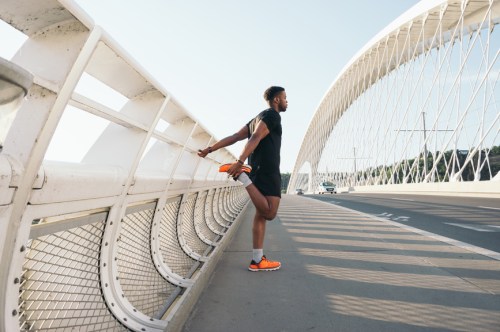You’ve likely heard that exercise has significant benefits, right? It can improve heart and lung health, boost strength, and support your mental wellbeing. But exercise has immunity benefits, too. Along with lifestyle habits like sleep, rest, managing stress, and a nutritious diet, exercising can help you stay healthy. And a recent study published in Brain, Behavior, and Immunity points to another potential facet of immune support: intense exercise after receiving a COVID-19 or influenza vaccine might increase antibody production.
For more information about why this connection could hold scientific promise, Mark Conroy, MD, an emergency room and sports medicine specialist, breaks down what happens in the body when you exercise and why it might benefit your immune system.
What are antibodies anyway
Antibodies are disease-fighting agents produced by the body, Dr. Conroy says. Typically, antibodies develop when the body comes into contact with a virus or pathogen (ie when you get sick with something). The immune system then creates the mechanism for killing those particles, according to the Mayo Clinic.
Enter stage left: vaccines. Vaccines are valuable tools to promote antibody development without getting sick first. Think: getting answers for the test from a classmate (shot) and hiding them in your sleeve during the exam. Vaccinations give the immune system the chance to create antibodies so that when you eventually come into contact with a pathogen, the hope is that your body is ready to it them into smithereens.
Ok, but how does exercise impact the immune system
Exercise does have a sizable effect on the immune system, Dr. Conroy says. Exercise, intense exercise especially, causes a stress response in the body. Stress responses typically cause the immune system to respond in several ways, including antibody production.
Additionally, lymph fluid is the immune system’s primary way of transporting necessary disease-fighting agents. Lymph, unlike blood, does not have a singular muscle like the heart to pump it. Instead, the continued contraction of your musculoskeletal system promotes the flow of lymph which, in turn, helps your body fight illness-causing pathogens. That is a complicated way to say that moving can help your immune system get disease-fighting agents, waste, dead cells, debris to the organs that flush them out of your system. It’s why going for a walk can help you get over a hangover: Your movement can get things where they need to go faster.
In this study, participants who cycled on a stationary bike or took a brisk 90-minute walk after their COVID-19 or influenza vaccination appointment produced more antibodies in the following four weeks than those who continued with their daily routine post-immunization. Those who exercised for 45 minutes did not register increased antibody levels.
This study is an excellent introduction to exercise as an immunity-boosting activity, Dr. Conroy says. “We know that exercise has a lot of health benefits from cardiovascular benefits, blood sugar benefits, mental health improvements, and stress management powers,” says Dr. Conroy. “We also do know that exercise can strengthen your immune system in a few ways.” In this instance, he says, more antibodies are better than no antibodies, and increased antibody production is even better. The results bode well for further information and research.
It’s worth noting that the sample group here was small: only 78 people. So the results point to a need for more research on the subject matter, Dr. Conroy says. It is the beginning of an exciting, necessary body of research to draw a firm line between exercise and vaccine efficacy. In the meantime, remember that getting your COVID-19 vaccination is the best way to protect yourself against serious illness.
Oh hi! You look like someone who loves free workouts, discounts for cutting-edge wellness brands, and exclusive Well+Good content. Sign up for Well+, our online community of wellness insiders, and unlock your rewards instantly.
Sign Up for Our Daily Newsletter
Get all the latest in wellness, trends, food, fitness, beauty, and more delivered right to your inbox.
Got it, you've been added to our email list.











